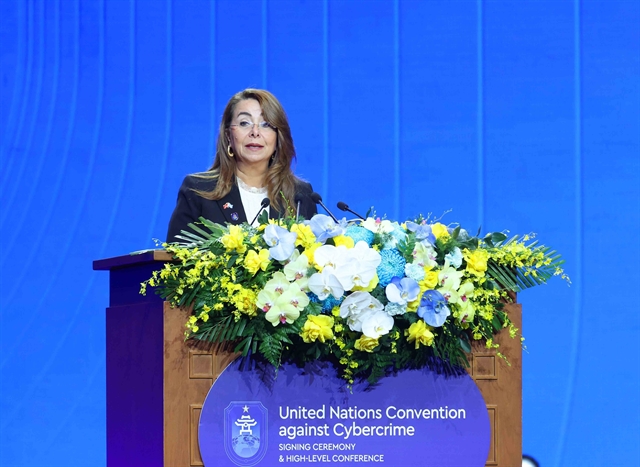HÀ NỘI ( WNAM MONITORING ): The UN Convention against Cybercrime is a resounding statement to multilateralism and the commitment of the international community to address cybercrime, said Ghada Waly, Executive Director of the United Nations Office on Drugs and Crime (UNODC) as she addressed the signing ceremony of the convention in Hà Nội on Saturday.
The document, also known as the Hanoi Convention after its signing location, took over five years of negotiations involving more than 150 member states, and enriched by 160 stakeholders from international organisations, NGOs, academia and the private sector.
“A new age of cyber crime is here,” stressed the UNODC executive director, citing how advances in software and artificial intelligence are redefining the scope, scale, and sophistication of cyber threats.
Large-scale ransomware attacks, phishing attempts and AI-powered online scams are becoming more common, while criminals are also becoming less and less constrained by borders, according to Waly.
Online sexual exploitation and abuse, especially cases involving children, is a particularly serious issue. The WeProtect Alliance found that reports of child sexual exploitation and abuse material increased by 87 per cent between 2019 and 2023.
“The impact of cybercrime on people is catastrophic, depriving them of their savings, livelihoods, safety, dignity, or even their lives,” Waly noted.
Despite the growing threats, responses to cyber criminal activities were fragmented across jurisdictions and ridden with gaps of technology and capacity, said the UNODC executive director.
Addressing this issue, the Hanoi Convention is considered a paradigm shift that fills in urgent gaps in the global response to cyber crime and provides a practical launch pad for collective action, according to the executive director.
The document provides unified legal standards by eliminating safe havens for cyber criminals and safeguarding human rights, while also bringing a universal framework for collecting, preserving, exchanging and using electronic evidence across different jurisdictions.
It also presents a joint platform where signatory countries can share intelligence, pursue additional cooperation and build capacitors. This is a platform open to every country and compatible with regional arrangements, bringing grounds to criminal offences.
To seize the historic opportunity provided by the Hanoi Convention, Waly stressed that the international community must achieve two objectives – the first being ensuring that the convention enters into force as early as possible by promoting signature and ratification by all UN member states.
The second goal is to pave the way for its full and effective implementation, including legislation, partnerships and technical capabilities.
“This requires a bold and sizable investment of political and financial resources, particularly to build capacities in developing countries, and it requires collaboration with the private sector and civil society to unlock the convention’s full potential,” noted Waly.
Thanking Việt Nam as the hosting country for the signing of the convention, the UNODC executive director said: “The UNODC is proud to support Việt Nam in organising this conference, and we will continue to count on Việt Nam’s leadership and partnership as we bring the new Convention into action.”


